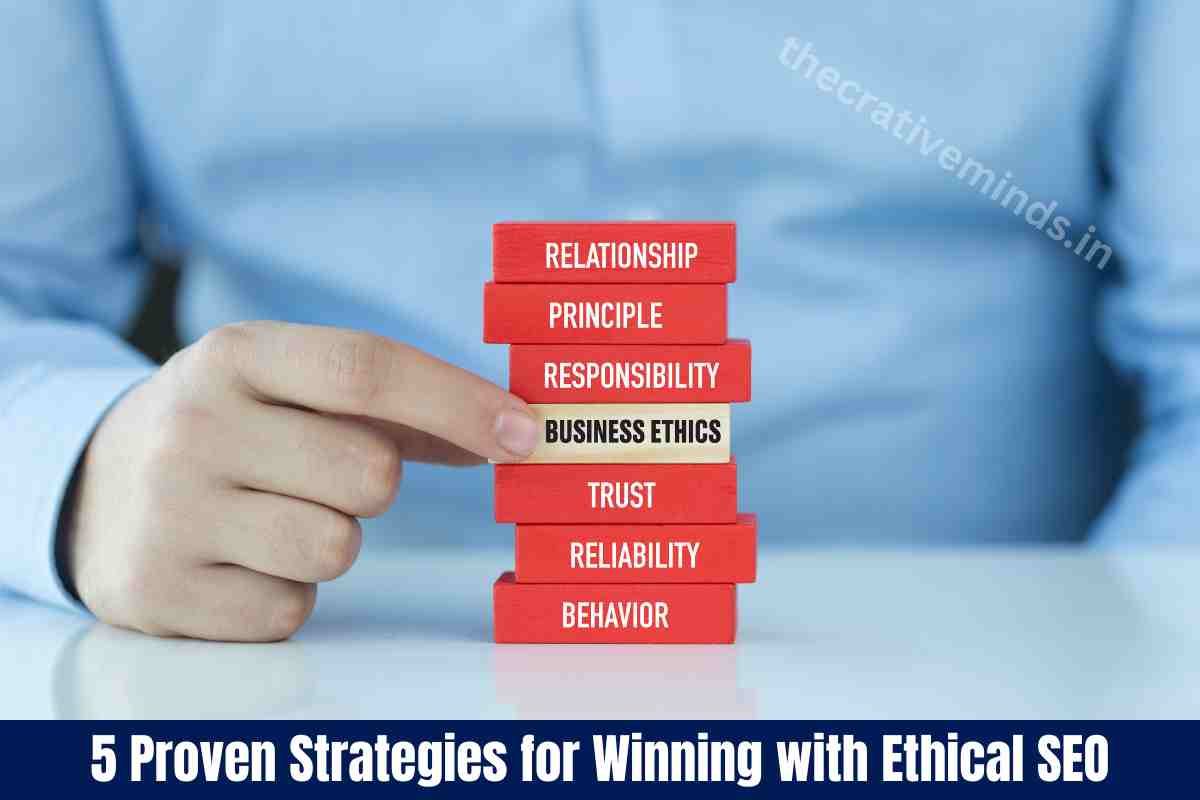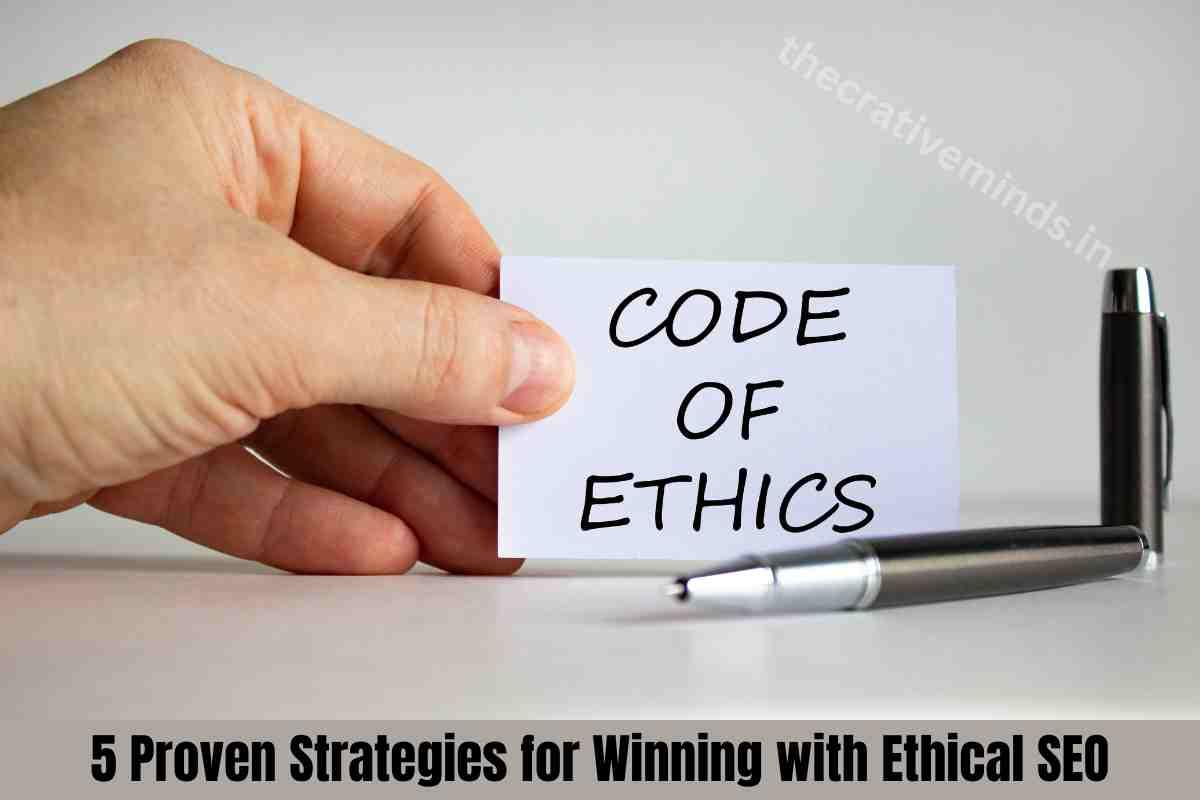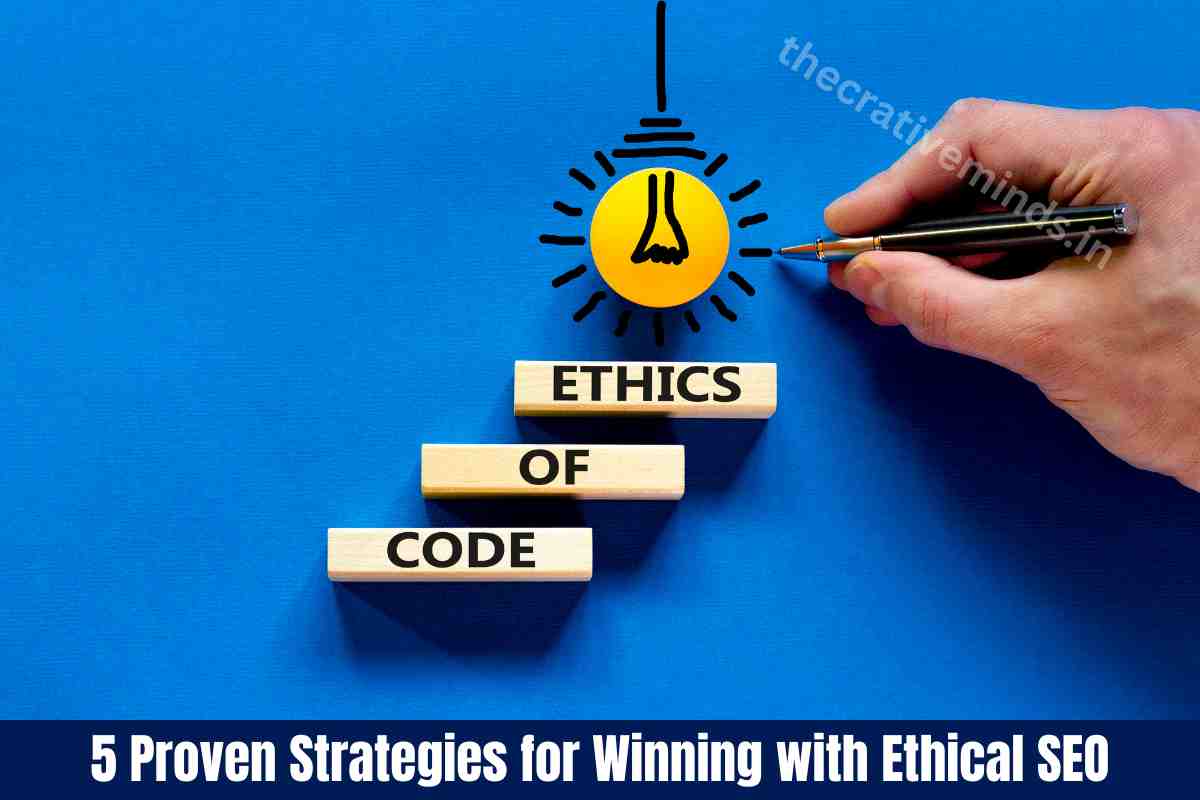Introduction: 5 Proven Strategies for Winning with Ethical SEO
5 Proven Strategies for Winning with Ethical SEO: In the ever-evolving landscape of digital marketing, Search Engine Optimization (SEO) stands out as a critical strategy for ensuring websites rank well in search engine results. SEO is not just about improving visibility; it’s about doing so ethically and in line with the guidelines set forth by search engines like Google. This distinction gives rise to two main approaches: Ethical SEO, often called “White Hat” SEO, and Unethical SEO, known as “Black Hat” SEO.
Ethical SEO involves using strategies, techniques, and tactics that focus on a human audience instead of search engines and completely follow search engine rules and policies. It’s about creating a positive user experience while offering content that is accessible and valuable. On the other hand, Black Hat SEO seeks to improve rankings in ways that search engines disapprove of and involve deception. While Black Hat strategies can offer quick wins, they pose a significant risk of penalization or even being banned by search engines.
This blog will delve into the importance of following guidelines in SEO, emphasizing Ethical SEO and White Hat techniques. Adhering to these practices not only aligns with the expectations of search engines but also ensures a sustainable and successful strategy for improving website visibility and performance over the long term.
Understanding Ethical SEO: 5 Proven Strategies for Winning with Ethical SEO
What is Ethical (White Hat) SEO?
Ethical SEO, widely known as White Hat SEO, refers to optimizing a website to improve its search engine rankings through techniques that strictly adhere to guidelines set by search engines. It prioritizes the user’s experience, offering valuable content and accessible, user-friendly website navigation. Ethical SEO builds a long-term online presence based on trust, quality, and relevance.
Importance of Adhering to Search Engine Guidelines
Search engines aim to provide users with the most relevant, high-quality content that matches their queries. To achieve this, they have developed complex algorithms and guidelines that help determine a website’s rank in search results. Following these guidelines is crucial for several reasons:
Sustainability: Ethical SEO strategies are designed to yield sustainable website traffic and rankings growth. Unlike Black Hat techniques, which might provide a quick boost, White Hat practices ensure steady progress over time without the risk of penalization.
User Trust: Websites that rank well through ethical means are more likely to be trusted by users. This trust translates into higher engagement rates, better conversion rates, and a more substantial online presence.
Avoiding Penalties: Search engines, notably Google, continuously update their algorithms to penalize websites that employ deceptive or manipulative practices. Adhering to guidelines protects your site from these penalties, which can severely impact visibility and traffic.
Core Principles of White Hat SEO: 5 Proven Strategies for Winning with Ethical SEO
To successfully implement Ethical SEO, it’s essential to understand its core principles:
Relevance and User Focus
Every content, from blog posts to product pages, should be created with the user in mind. This means offering value, answering users’ questions, and ensuring that content is directly relevant to their searches.
Transparency and Honesty
Ethical SEO practices require transparency with users and search engines. This includes honest representation of your content, business, and the nature of your website. Misleading users or employing tricks to improve search engine rankings can lead to penalties.
Commitment to Quality
Quality is at the heart of White Hat SEO. This encompasses the content, user experience, site speed, mobile optimization, and overall website architecture. A quality commitment ensures visitors have a positive experience, encouraging them to return.
Effective White Hat SEO Strategies: 5 Proven Strategies for Winning with Ethical SEO
Keyword Research and Effective Use
Keyword Research: The cornerstone of any SEO strategy is keyword research, which involves identifying the terms and phrases your target audience uses when searching for information, products, or services related to your business. Utilize tools like Google Keyword Planner, SEMrush, or Ahrefs to find relevant keywords with high search volumes and achievable competition levels.
Effective Use of Keywords: Once you’ve identified your keywords, integrate them naturally into your website’s content, titles, meta descriptions, and URLs. The key is to use them in a way that feels organic and enhances readability, avoiding keyword stuffing, which can negatively impact your SEO efforts.
High-Quality Content Creation
Creating high-quality, engaging, and informative content is pivotal in attracting and retaining visitors. Content should provide real value to your audience, answering their questions and addressing their needs. This can take various forms, including blog posts, videos, infographics, and guides. Consistently publishing quality content helps with search rankings and establishes your site as an authority in your niche.
On-Page SEO Optimization
On-page SEO involves optimizing individual web pages to rank higher and earn more relevant traffic. This includes:
Title Tags and Meta Descriptions: Craft compelling title tags and meta descriptions with targeted keywords. These elements influence not only click-through rates (CTRs) from the search.
Header Tags: Use header tags (H1, H2, H3, etc.) to structure your content clearly for users and search engines.
Image Optimization: Optimize images by compressing them for faster loading times and using descriptive file names and alt attributes to improve accessibility and relevance.
Ethical Link Building Practices
Link building is acquiring hyperlinks from other websites to your own. Ethical link building focuses on earning links naturally by creating high-quality content and establishing genuine relationships with other web admins. Tactics include guest blogging, creating shareable infographics, and participating in industry forums or discussions. Avoid purchasing links or participating in link schemes, as these are considered Black Hat SEO practices.
The Dangers of Black Hat SEO: 5 Proven Strategies for Winning with Ethical SEO
While Black Hat SEO tactics might offer short-term gains in rankings, they come with high risks, including the potential for your site to be penalized or banned by search engines. Common Black Hat techniques to avoid include keyword stuffing, cloaking, using private link networks, and content scraping. Adhering to White Hat SEO practices ensures your SEO efforts are sustainable and beneficial in the long term.
These strategies highlight the importance of adopting ethical approaches to SEO. You can achieve lasting success in search engine rankings by focusing on quality content, user experience, and natural link-building. The following section will delve into tools and techniques for implementing and tracking the effectiveness of these White Hat SEO strategies.
Tools and Techniques for Ethical SEO: 5 Proven Strategies for Winning with Ethical SEO
SEO Tools for White Hat Techniques
Google Analytics: An essential tool for any website owner, Google Analytics provides in-depth insights into your website’s traffic, user behaviour, and conversion rates. Use it to track the effectiveness of your SEO strategies and make data-driven decisions.
Google Search Console: This tool allows you to monitor your site’s presence in Google search results, understand which queries bring users to your site, and identify issues that Google has found with your site. It’s invaluable for SEO as it directly reflects how Google views your site.
SEMrush: A comprehensive SEO tool that offers features for keyword research, site audits, competitor analysis, and more. SEMrush can help you identify keywords you’re ranking for, find new opportunities, and track your site’s SEO progress.
Ahrefs: Similar to SEMrush, Ahrefs provides tools for keyword research, competitor analysis, backlink research, and content exploration. Its site audit feature can also help you identify and fix technical SEO issues on your site.
Moz Pro: Known for its domain authority metric, it offers a suite of SEO tools that help with keyword research, link building, site audits, and page optimization suggestions. It’s beneficial for assessing the quality of your backlinks and understanding your competitors’ SEO strategies.
Analyzing and Tracking SEO Performance: 5 Proven Strategies for Winning with Ethical SEO
To effectively use these tools for ethical SEO, focus on the following techniques:
Regular Site Audits: Conduct regular site audits to identify technical SEO issues, such as broken links, slow page load times, or crawl errors. Fixing these issues can significantly improve your site’s search engine ranking and user experience.
Keyword Performance Tracking: Keep track of your targeted keywords’ performance in search engine rankings. Analyze which pages rank well and why, then apply those insights to optimize other content on your site.
Backlink Analysis: Use tools like Ahrefs or Moz to analyze your backlink profile. Look for opportunities to gain high-quality backlinks from reputable sites in your industry, and monitor for any potentially harmful links that could impact your SEO efforts.
Competitor Analysis: Understanding your competitors’ SEO strategies can provide valuable insights. Analyze their keyword targeting, content quality, and backlink profile to identify opportunities for your site.
Implementing Ethical SEO with Tools and Techniques
Combining the power of these SEO tools with ethical strategies and techniques provides a solid foundation for improving your website’s search engine ranking while adhering to best practices. Remember, the goal of ethical SEO is not just to improve rankings but to provide value to your users and create a positive, lasting online presence.
Case Studies: 5 Proven Strategies for Winning with Ethical SEO
Case Study 1: Local Business Dominates Through Content Marketing
Background: A local bakery in a competitive urban area sought to increase its online visibility and drive more foot traffic to its store.
Strategy: Instead of resorting to quick-fix SEO tactics, the bakery focused on creating high-quality, engaging content related to baking, recipes, and the joys of local ingredients. They optimized their website for local SEO, including accurate NAP (Name, Address, Phone Number) details across directories, and actively engaged with their community through social media.
Results: Over a year, the bakery saw a significant increase in organic search rankings for key terms related to their business. Their website traffic doubled, and the increased online visibility led to a noticeable uptick in foot traffic and custom cake orders. The bakery’s commitment to quality content and community engagement established it as a trusted and beloved local brand.
Case Study 2: E-commerce Site Thrives with Ethical Link Building
Background: An online retailer specializing in eco-friendly home goods faced challenges breaking into a saturated market.
Strategy: Understanding the importance of backlinks for SEO, the retailer embarked on an ethical link-building campaign. They reached out to blogs and websites related to sustainability, offering to write guest posts and provide valuable content for their readers. They also leveraged social media to create shareable content, encouraging natural backlinks.
Results: The e-commerce site experienced a steady growth in organic search rankings for their targeted keywords. The quality backlinks acquired through ethical means improved their domain authority and brought in targeted traffic interested in sustainable living. Sales increased by 40% year-over-year, mainly due to improved SEO performance.
Case Study 3: Tech Startup Achieves Global Reach with User-Focused SEO
Background: A tech startup aimed to expand its reach globally, targeting users interested in their innovative project management tool.
Strategy: The startup focused on creating a multilingual website with high-quality, user-focused content. They conducted extensive keyword research to understand the search intent of their global audience and optimized their site accordingly. The startup also ensured a seamless mobile user experience, recognizing the global trend towards mobile search.
Results: Within months, the startup saw its website ranking in the top positions for critical global search terms related to its product. The strategy attracted a diverse international audience, leading to increased sign-ups and a broadened user base. Their focus on user experience and quality content translated into high engagement and low bounce rates, further boosting their SEO efforts.
These case studies demonstrate the power of ethical SEO practices in achieving lasting success. Businesses across various industries can improve online visibility and drive genuine, sustainable growth by focusing on quality content, ethical link-building, and a user-centric approach.
5 Proven Strategies for Winning with Ethical SEO:- Ethical SEO and White Hat techniques align with search engine guidelines and foster trust and loyalty among users. As we conclude our exploration of ethical SEO practices, remember that the essence of SEO lies in providing value to your audience and building a positive, lasting online presence.
Contents
- 1 Introduction: 5 Proven Strategies for Winning with Ethical SEO
- 2 Understanding Ethical SEO: 5 Proven Strategies for Winning with Ethical SEO
- 3 Core Principles of White Hat SEO: 5 Proven Strategies for Winning with Ethical SEO
- 4 Effective White Hat SEO Strategies: 5 Proven Strategies for Winning with Ethical SEO
- 5 The Dangers of Black Hat SEO: 5 Proven Strategies for Winning with Ethical SEO
- 6 Tools and Techniques for Ethical SEO: 5 Proven Strategies for Winning with Ethical SEO
- 7 Case Studies: 5 Proven Strategies for Winning with Ethical SEO







Recent Comments